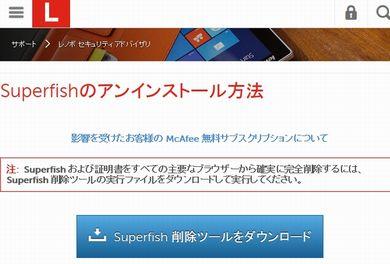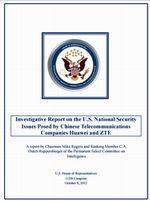
Think about your own security from the spyware uproar lurking in electronic devices: Sakahara's honored information security consulting room (1amp 2 pages)
The author told you in some seminars and other occasions a few years ago that it is best not to use the electronic devices of some manufacturers for parts related to social infrastructure. There are several bases, but one of the well-known events continues into 2015.
For example, in February, it was found that Lenovo's laptop was mixed with malicious adware called "SuperFish" (related reports). Details in the relevant reports, "SuperFish" has the following characteristics.
「SuperFish」問題でLanovoは削除ツールを提供するなど対応も図ったがWhat does that mean? Some websites also have, for example, when users visit the A Bank website and try to do some bank processing there, when they see the e-Cert, the certification body becomes "SuperFish" instead of "A Bank". It may even create the root certificate of the system, which can be a great problem and fundamentally shake the trust of the Internet.

There was a similar uproar in 2012 before the incident. It has been pointed out that ZTE set a back door called "ScoreM" on smartphones sold in May of the same year, and the company acknowledges this (related article).
These events will only affect the foundation of IT trust, which is really a terrible thing. However, although there are not many reports, it has been pointed out a long time ago that illegal chips have been embedded in some devices during the manufacturing stage.
米国下院の特別委員会による報告書As actual public information, the Chinese government issued an advisory in October 2012 urging the standing Special Committee on Information issues of the United States House of Commons to suspend the use of some manufacturers' products because of the danger of loading the back door into the equipment involved in the United States communications network (related PDF). During the same period, the Canadian government hinted at the same concerns, and in 2013, the Defense Infrastructure Association released information on the translation of the American proposal into Japanese (see PDF).
As an American company, Microsoft also released the results of a survey that about 20% of Chinese-made PC were illegally processed during shipments.
The manufacturers listed here are still known as large manufacturers of smartphones, and their products are also sold in China. In addition, it is not only the terminal, but also has a worldwide share in the field of backbone systems that make up the communication network. But it was in the mid-2000s that governments began to express concern and response. For example, problematic Lenovo products have been banned by intelligence agencies in Australia, the United States, the United Kingdom, Canada and New Zealand because they have previously been suspected of unauthorized access.
私たちはどう考える?